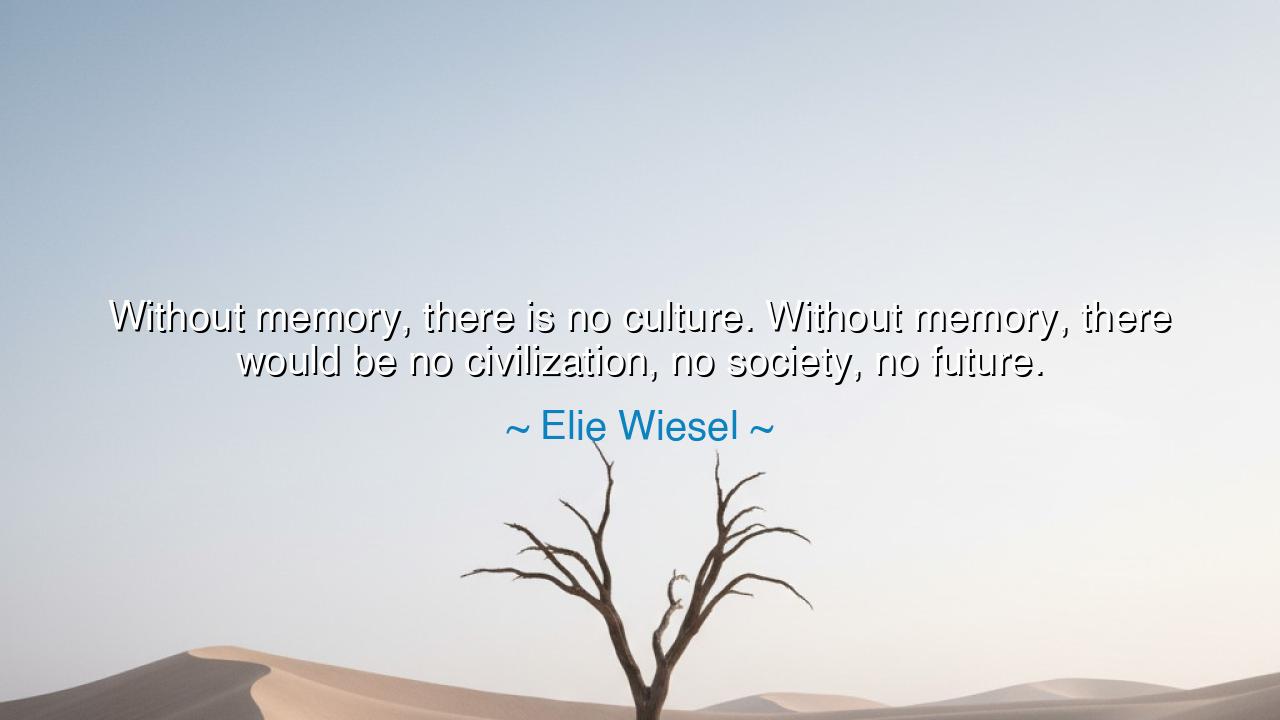
Without memory, there is no culture. Without memory, there would
Without memory, there is no culture. Without memory, there would be no civilization, no society, no future.






When Elie Wiesel spoke of memory, he spoke of the very essence of what it means to be human. His words, “Without memory, there is no culture. Without memory, there would be no civilization, no society, no future,” carry the weight of generations, each building upon the stories, the lessons, and the experiences of those who came before. Memory is the bridge between the past and the future, the repository of all that has shaped us as individuals, families, communities, and nations. It is in memory that we find our identity, for it is the stories we remember and retell that create the fabric of our lives, our cultures, and our shared destinies.
The ancients held memory in high regard, recognizing it as the cornerstone of all human achievement. In ancient Greece, philosophers like Herodotus and Plato understood that history—our collective memory—is the means by which we pass down wisdom from one generation to the next. Herodotus, the father of history, wrote not just to record events but to ensure that the lessons of the past would never be forgotten, for without memory, people would be doomed to repeat their mistakes. Memory, he knew, is not just about recalling the past, but about ensuring that the lessons of that past inform the future. Wiesel’s words echo this same truth: memory shapes the world we live in and the world that is to come.
Consider the great story of Cyrus the Great, the founder of the Persian Empire, whose conquests and leadership laid the foundation for a civilization that would endure for centuries. Cyrus was not just a conqueror but a visionary who understood the importance of memory in creating a lasting legacy. He established laws, built infrastructure, and promoted tolerance, all of which were meant to leave a lasting imprint on future generations. Cyrus’s empire was not built merely on military might, but on the memory of what he and his people had achieved together. His story, and the memory of his deeds, has been passed down through generations, forming part of the civilization that followed. In this way, memory is not just a record of what has happened; it is a foundation for future societies to build upon.
In Rome, the memory of Rome’s founding was a sacred story, passed down through generations in the form of myths, poems, and historical records. Virgil’s Aeneid, for example, immortalized the tale of Aeneas, the hero who escaped the fall of Troy and founded the Roman people. The Romans understood that to preserve their culture, they had to preserve their memory, for it was through the retelling of stories like these that the people understood their purpose, their identity, and their place in the world. Memory, for the Romans, was not a passive act; it was an active force that created a sense of belonging and a vision of the future.
In modern times, we see the same principle at play in Elie Wiesel’s own life. A survivor of the Holocaust, Wiesel understood more deeply than most the importance of memory. He dedicated his life to ensuring that the horrors of the Holocaust were never forgotten, for to forget would be to erase the lessons that could prevent future atrocities. Wiesel’s memory of the suffering, the loss, and the resilience of his people became a moral compass for the world, reminding us that without memory, we lose not just the past, but the very lessons that guide us toward a more just and compassionate future. His work, and his words, serve as a testament to the power of remembering.
The lesson from Wiesel’s words is clear: memory is the foundation of all we hold dear. Without memory, we have no culture, for culture is born from the stories and traditions that are passed down through the generations. Without memory, there is no civilization, for civilization is built on the knowledge and wisdom of those who came before. Without memory, we have no society, for society is a tapestry woven from the shared experiences of all its members. And without memory, there is no future, for it is the wisdom of the past that shapes the path forward.
So, let us take care to remember—not just the great events of history, but the small moments that shape our lives, our families, and our communities. Let us remember the lessons of the past, and let those lessons guide us as we build the future. Memory is not just a passive act, but an active force, one that requires us to reflect, learn, and pass on the wisdom we have received. In this way, we honor the ancient truth that without memory, there is no future, and with memory, we hold the key to a better, wiser world.






AAdministratorAdministrator
Welcome, honored guests. Please leave a comment, we will respond soon